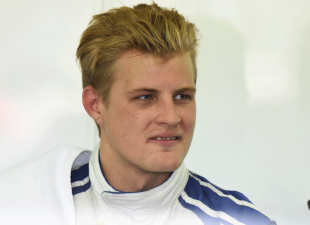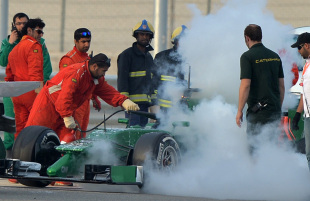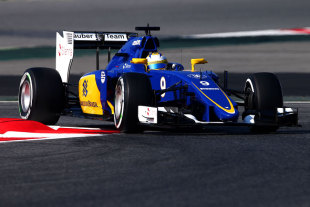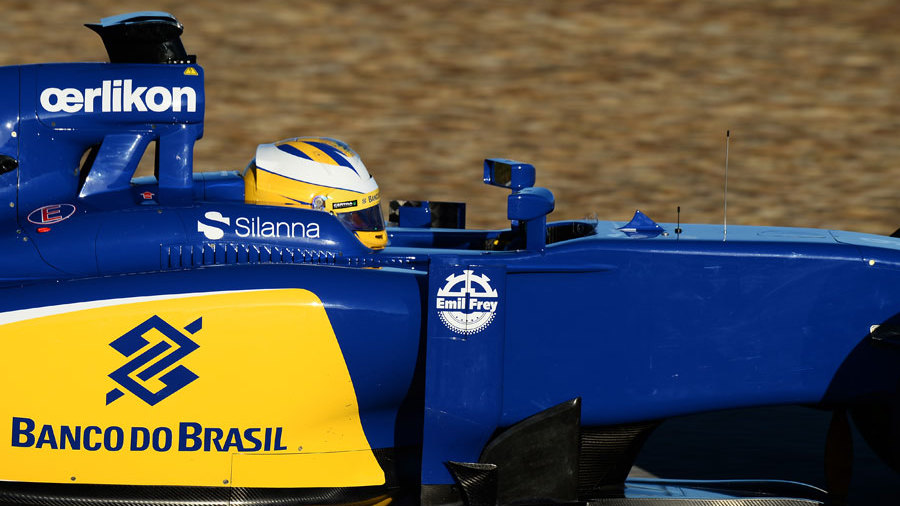- Interview with Marcus Ericsson
'I'm more than just a pay driver' - Ericsson
Nate Saunders March 6, 2015After a tricky rookie season at Caterham in 2014, Marcus Ericsson revived his Formula One career by signing for Sauber. ESPN caught up with him in Barcelona to talk about his hopes for a first points finish, the pay driver label and how he deals with the pressure as Sweden's first F1 driver in two decades.

You joined Sauber from Caterham last season. How have you adjusted to life at a new team over the winter?
It's going really well. I think I'm getting more and more at home in the team and one of the really good things for me was I got the deal so early. Already on November 1 we had the deal done with Sauber and that meant I could start preparing myself very early, spend some time in the factory and of course I did two days of testing in Abu Dhabi [the week after the 2014 grand prix].
You were at a back-marking team last season. How exciting is it this year to be at a team aiming for points again?
It's very difficult when you're at a team like Caterham when you have probably the worse car on the grid. Obviously you want to show what you can do and Formula One is about the package you have underneath you and that made last year very difficult, both mentally and driving-wise. It's really exciting to get the chance now with Sauber. They also had a very tough 2014 but I think already we can see we are making good progress - both on the car and on the power unit side. So that makes it all feel positive and looking forward to getting to Melbourne to see where we are among the competitors. But for me myself as well, to aim for points is exciting. That's where you want to be, you don't want to be at the back just doing the numbers. You want to be fighting.
How different is Sauber to Caterham on an organisational level?
First of all you can really feel the experience at Sauber. They have a lot of experience in Formula One and you can really feel there is a strong structure in the team, everyone feels like they know what they need to do. I have nothing bad to say about Caterham but there wasn't this structure there. You could feel it was a new team, basically. That's a big difference and for a driver it gives you more confidence, it's the best situation really.
The last months at Caterham sounded pretty chaotic to say the least. On top of all that, you were in your rookie season. How difficult was it coming into that environment?
It was very difficult, because as you say the turbulence outside the track did not make it easier. Also the fact that the car was not the strongest, to say the least! It was a very difficult year but I look very positively at last year because I learned a lot. It was really good to practice your mental strength as well because there were a lot of times when it was tough and frustrating. Really just the fact that I was able to finish off really strong in the last three rounds before I stopped - that meant a lot for both myself and getting a deal with Sauber. That's something that I've brought with me, even though it was extremely tough I could keep on working hard and kept on focusing on my targets and I managed to show some of my potential at the end of the year.

When Caterham were surviving race to race at the beginning of the season, do you think that uncertainty held you back as a driver?
To be honest, from my point of view, we were always working like we were going to do the whole season. Even though there were rumours and we knew the team was struggling a bit, me and my engineers were focusing on doing the job normally. I didn't really feel like that was much in the results, it was more down to the car not being as strong as we had hoped. We were hoping to have a car that was a lot stronger at the start of last year and that was not a fact. It was tough that way and as a driver when you come into Formula One, especially in a car that's not competitive, it's very easy to over-drive and you want so much to show what you can do and then it's not possibly to do it because you don't have the material.
Then you start making mistakes and start getting frustrated and I think it was more a case of that. I learnt that in Formula One it's important to work with the material you have, with the people you have around you and maximise your own performance and the team's performance. That's all you can focus on. Once you are doing all that you can start fighting other people and start seeing where you are. You cannot look too much at the opposition because everyone else had their own car and their own package.
It sounds like you think you grew a lot as a driver last year. How can you put that into practice at Sauber?
I think it's the same philosophy at a team like Sauber. You cannot look too much on other people, you need to focus on yourself and maximising what you have. You can feel that here at Sauber, we have our own programme which we followed all testing and focused on ourselves. We are just focused on preparing ourselves as best we can for the first races.
At the moment there is a negative connotation attached to "pay drivers", sometimes regardless of success before Formula One. Does that bother you?
I think I proved myself in junior categories, I won two championships. Last year I matched Caterham's best-ever result and did some really strong performances at the end, when I was out-performing Kamui [Kobayashi] who is a very respected driver. I think I proved I am a good enough to be here and that's all I think about. I get the confidence of the team to drive the team and that's all I care about, I don't care about the others.
When you're in a car at Caterham like last year, it's very difficult to prove [your talent]. Even if you do a fantastic race nobody knows because you're so far off! It's really difficult to make an impact but now I have more of an opportunity to show off my potential.

You're against a rookie this season, Felipe Nasr. What do you know about him from your time competing against each other in GP2?
It's a bit of a different situation to last year, where I had a very experienced team-mate. Now Felipe is a rookie but he had a good year's experience with Williams. I think we will push each other well because we raced each other in GP2 and were always on similar pace. This year we are going to be able to push each other hard, we're two young drivers who want to establish ourselves and I'm sure both of us want to establish ourselves. If you look at the history of Sauber it's one of the best teams in establishing young drivers so I think this is the perfect place for me.
How has the pressure been from Sweden back home? Before last year it had been a long time since there had been a Swede in F1.
There was a big buzz last season when it was announced I got the drive in Formula One. Then the results weren't great and it took a bit of a dive! But I think now again everyone is excited. I have to say the support I get from Sweden is fantastic. Last year at the races there were lots of Swedish flags. Sweden has been waiting a long time for an F1 driver.
And finally, it's early days yet, but have you set yourself a target for 2015?
It's extremely difficult in Formula One to set specific targets but for me as a driver, I didn't score a point last year. I was extremely close to it with the 11th in Monaco but it would be like a victory to score a point this year. When we are a couple of races into the season we will know a little bit more where we are and then we can start thinking about a specific target.

Nate is assistant editor of ESPNF1

